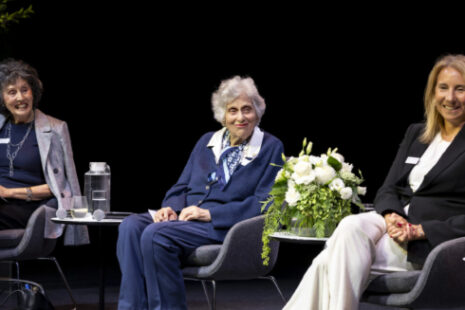Boredom, the space in which creativity and imagination happens

Dr Charlotte Keating (’99) shared her expertise as a clinical psychologist at our Girls Talk: ‘Supporting Young People in COVID Normal’ for parents on Monday evening of this week. Dr Keating has a PhD in Neuroscience and is uniquely placed to understand the needs of young people following her direct involvement as an advisor to both the Alannah & Madeline Foundation and Dolly’s Dream.
 Dr Keating spoke of the social impacts for children and teens following the lockdown encountered in Melbourne in 2020. Examples such as a loss of opportunity for taking real world risks, and a lack of attainment of normal developmental milestones coupled with the overstimulation of the brain brought about by screen switching has led to a notable increase in the social and emotional issues arising in young people, both locally in Melbourne and certainly being experienced in far greater numbers around the world where a ‘normal existence’ is far removed from what we are experiencing now in Australia.
Dr Keating spoke of the social impacts for children and teens following the lockdown encountered in Melbourne in 2020. Examples such as a loss of opportunity for taking real world risks, and a lack of attainment of normal developmental milestones coupled with the overstimulation of the brain brought about by screen switching has led to a notable increase in the social and emotional issues arising in young people, both locally in Melbourne and certainly being experienced in far greater numbers around the world where a ‘normal existence’ is far removed from what we are experiencing now in Australia.
I am personally ‘guilty’ of having three, sometimes four screens open at any one time during the course of a typical lockdown day last year; as such, I was particularly interested in Dr Keating’s comments about the impact of a term known as ‘fast-switching between screens’. Perhaps even more alarming is that this activity now has a technical term: Electronic Screen Syndrome, otherwise known as ESS. The impact of flipping between screens is currently the core of much research with early indications suggesting such brain toggling causes an overstimulation of the brain. Whilst this may be manageable in adults, the impact for young people can be significant. An inability to concentrate and pay attention results from a conditioning of the brain to not focus on any one thing for any substantial length of time.
According to researchers of Iowa University, 90% of children master the tablet by the age of two. Such devices tend to intrude on children’s visual and mental space, sometimes more seriously, causing addiction. The Electronic Screen Syndrome designates an overstimulation of the children’s nervous system that can negatively influence behaviour, mood and focus.
In her presentation on Monday, Dr Keating emphasised the need for children to experience boredom. Fundamentally, boredom is the space in which creativity and imagination happens. Paediatrician, Michael Rich of Harvard University also reported the growing human brain is constantly building neural connections while pruning away less-used ones, and digital media use plays an active role in that process. Much of what happens on screen provides “impoverished” stimulation of the developing brain compared to reality, he says. Children need a diverse menu of online and offline experiences, including the chance to let their minds wander. (Rich, 2019)
 I was also interested in Dr Keating’s commentary on the very common occurrence of ‘friendship drift’ that commonly occurs in the early teenage years. Friendship drift is a very natural and normal part of growing up, yet can be quite a challenging experience as young people ‘find their tribe’. The complexity with COVID last year was that the Stay at Home restrictions limited opportunity to find other or new friends during this time. With this in mind, the FOMO (Fear of Missing Out) potentially by not living within a 5km radius of certain friends caused a deal of adolescent angst, coupled with much worry about returning back to school with feelings of uncertainty where one fitted in the social dynamics. Fortunately, students at St Catherine’s who reported this worry, found this was quickly alleviated within days as they resettled amongst cohorts with a return to the classroom and Co-curricular activities this year, enabling the introduction to new friends.
I was also interested in Dr Keating’s commentary on the very common occurrence of ‘friendship drift’ that commonly occurs in the early teenage years. Friendship drift is a very natural and normal part of growing up, yet can be quite a challenging experience as young people ‘find their tribe’. The complexity with COVID last year was that the Stay at Home restrictions limited opportunity to find other or new friends during this time. With this in mind, the FOMO (Fear of Missing Out) potentially by not living within a 5km radius of certain friends caused a deal of adolescent angst, coupled with much worry about returning back to school with feelings of uncertainty where one fitted in the social dynamics. Fortunately, students at St Catherine’s who reported this worry, found this was quickly alleviated within days as they resettled amongst cohorts with a return to the classroom and Co-curricular activities this year, enabling the introduction to new friends.
Dr Keating’s advice and support for parents included encouragement for adopting a range of protective factors, including seeking opportunities for developing resilience and self-worth such as:
- Encouraging multiple friendship groups;
- Ensuring strong family connections;
- Encouraging spirituality and / or being in nature;
- Seeking opportunities for volunteering;
- Connecting to something bigger than self;
- Developing skills that enable a healthy perspective, gratitude and empathy with the notion it ‘feels good to do good’.
In summary, Dr Keating provided the following:
“Young people work out ‘who they are’ through social connection, building resilience through relationships and experiences where they have fun, feel valued and worthwhile. Technology can have positive and negative impacts on well-being and development but collaboratively there is a need for parents to work to some change habits – balancing online and offline activities that support reaching the developmental milestones. The teen brain, in particular, is sensitive. Parents are encouraged to have a list of ways to help young people proactively manage stress with priorities such as, relaxation and having fun.”
Reference: Rich, M (2019) https://hms.harvard.edu/news/screen-time-brain





